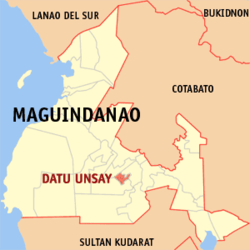Datu Unsay, Maguindanao
Datu Unsay, officially the Municipality of Datu Unsay (Maguindanaon: Ingud nu Datu Unsay; Iranun: Inged a Datu Unsay; Tagalog: Bayan ng Datu Unsay), is a 5th class municipality in the province of Maguindanao, Philippines. According to the 2015 census, it has a population of 11,813 people.[3]
Datu Unsay | |
|---|---|
| Municipality of Datu Unsay | |
 Map of Maguindanao with Datu Unsay highlighted | |
OpenStreetMap 
| |
.svg.png) Datu Unsay Location within the Philippines | |
| Coordinates: 6°55′15″N 124°27′12″E | |
| Country | |
| Region | Bangsamoro Autonomous Region in Muslim Mindanao (BARMM) |
| Province | Maguindanao |
| District | 2nd District |
| Barangays | 8 (see Barangays) |
| Government | |
| • Type | Sangguniang Bayan |
| • Mayor | Andal S. Ampatuan V |
| • Vice Mayor | Janine A. Mamalapat |
| • Congressman | Esmael "Toto" Gaguil Mangudadatu |
| • Electorate | 6,709 voters (2019) |
| Area | |
| • Total | 95.39 km2 (36.83 sq mi) |
| Population (2015 census)[3] | |
| • Total | 11,813 |
| • Density | 120/km2 (320/sq mi) |
| • Households | 1,769 |
| Economy | |
| • Income class | 5th municipal income class |
| • Poverty incidence | 57.61% (2015)[4] |
| • Revenue (₱) | 37,936,885.60 (2016) |
| Time zone | UTC+8 (PST) |
| ZIP code | 9608 |
| PSGC | |
| IDD : area code | +63 (0)64 |
| Climate type | tropical climate |
| Native languages | Maguindanao Tagalog |
| Website | www |
History
Datu Unsay was created under Muslim Mindanao Autonomy Act No. 150 on July 1, 2003,[5][6] carved out of the municipality of Shariff Aguak. The town is named after its former mayor Andal "Datu Unsay" Ampatuan, Jr.
On July 30, 2009, upon the ratification of Muslim Mindanao Autonomy Acts No. 225 (as amended by MMAA 252) and MMAA 220, the municipalities of Shariff Saydona Mustapha and Datu Hoffer Ampatuan, respectively, were created from a total of 2 entire barangays and portions of 2 barangays from Datu Unsay, in addition to other barangays from Datu Piang, Datu Saudi-Ampatuan, Mamasapano and Shariff Aguak.
Barangays
Datu Unsay is politically subdivided into 8 barangays.
- Bulayan
- Iganagampong
- Macalag
- Maitumaig
- Malangog
- Meta
- Panangeti
- Tuntungan
Climate
| Climate data for Datu Unsay, Maguindanao | |||||||||||||
|---|---|---|---|---|---|---|---|---|---|---|---|---|---|
| Month | Jan | Feb | Mar | Apr | May | Jun | Jul | Aug | Sep | Oct | Nov | Dec | Year |
| Average high °C (°F) | 31 (88) |
32 (90) |
32 (90) |
32 (90) |
31 (88) |
29 (84) |
29 (84) |
29 (84) |
30 (86) |
30 (86) |
30 (86) |
31 (88) |
31 (87) |
| Average low °C (°F) | 21 (70) |
21 (70) |
21 (70) |
23 (73) |
23 (73) |
23 (73) |
23 (73) |
23 (73) |
23 (73) |
23 (73) |
23 (73) |
22 (72) |
22 (72) |
| Average precipitation mm (inches) | 30 (1.2) |
19 (0.7) |
25 (1.0) |
24 (0.9) |
64 (2.5) |
88 (3.5) |
102 (4.0) |
105 (4.1) |
76 (3.0) |
82 (3.2) |
60 (2.4) |
26 (1.0) |
701 (27.5) |
| Average rainy days | 9.8 | 8.5 | 11.3 | 11.9 | 21.6 | 23.9 | 24.1 | 24.5 | 20.9 | 21.8 | 16.8 | 11.8 | 206.9 |
| Source: Meteoblue (modeled/calculated data, not measured locally) [7] | |||||||||||||
Demographics
| Year | Pop. | ±% p.a. |
|---|---|---|
| 2007 | 40,522 | — |
| 2010 | 12,490 | −34.84% |
| 2015 | 11,813 | −1.06% |
| Source: Philippine Statistics Authority[3][8][9][10] | ||
References
- "Municipality". Quezon City, Philippines: Department of the Interior and Local Government. Retrieved 31 May 2013.
- "Province: Maguindanao". PSGC Interactive. Quezon City, Philippines: Philippine Statistics Authority. Retrieved 12 November 2016.
- Census of Population (2015). "ARMM – Autonomous Region in Muslim Mindanao". Total Population by Province, City, Municipality and Barangay. PSA. Retrieved 20 June 2016.
- "PSA releases the 2015 Municipal and City Level Poverty Estimates". Quezon City, Philippines. Retrieved 12 October 2019.
- "Muslim Mindanao Autonomy Act No. 150; An Act Creating the Municipality of Datu Unsay out of the Mother Municipality of Shariff Aguak, Province of Maguindanao, Authorizing the Appropriation Funds Therefor, and for Other Purposes" (PDF). Regional Legislative Assembly, Autonomous Region in Muslim Mindanao. Retrieved 27 January 2016.
- Philippine Statistics Authority (2008-04-16). "2007 Census of Population: Autonomous Region in Muslim Mindanao" (PDF). Archived from the original (PDF) on 2008-09-05. Retrieved 2008-05-19.
- "Datu Unsay, Maguindanao : Average Temperatures and Rainfall". Meteoblue. Retrieved 19 January 2019.
- Census of Population and Housing (2010). "ARMM – Autonomous Region in Muslim Mindanao". Total Population by Province, City, Municipality and Barangay. NSO. Retrieved 29 June 2016.
- Censuses of Population (1903–2007). "ARMM – Autonomous Region in Muslim Mindanao". Table 1. Population Enumerated in Various Censuses by Province/Highly Urbanized City: 1903 to 2007. NSO.
- "Province of Maguindanao". Municipality Population Data. Local Water Utilities Administration Research Division. Retrieved 17 December 2016.
External links
- Datu Unsay Profile at PhilAtlas.com
- MMA Act No. 150 : An Act Creating the Municipality of Datu Unsay in the Province of Maguindanao
- Philippine Standard Geographic Code
- 1995 Philippine Census Information
- 2000 Philippine Census Information
- 2007 Philippine Census Information
- Local Governance Performance Management System